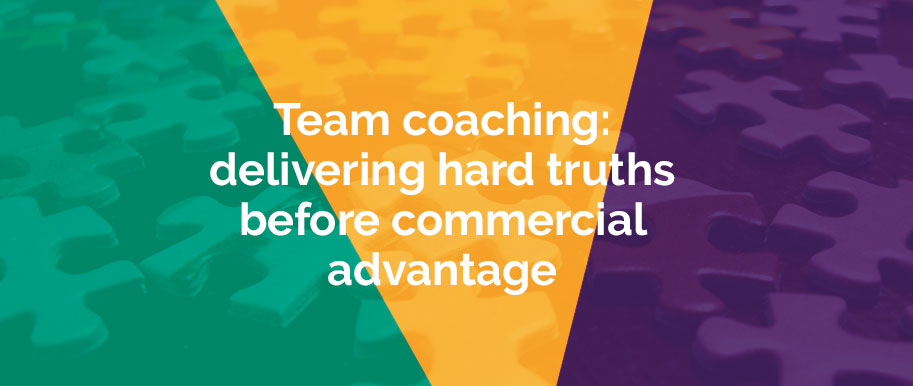Senior business leaders have heavy responsibilities on their shoulders; steering the entire business in the right direction and ensuring all teams and staff are communicating effectively and performing to their full potential. No mean feats by any stretch of the imagination.
So, it’s easy to assume that the senior team functions to the best of its collective and individual abilities – they must be, they’re the most senior people in the business. The reality is often quite different. Inconsistent messages and behaviour at a senior level filter down through the business and have far-reaching negative commercial implications. Team coaching to develop a senior intact team doesn’t just deliver results in the short term, it provides the tools to make lasting cultural change that sustains commercial advantage.
Egos, backbiting and a high level of dysfunction
Recognising that something within the business needs to change is crucial to team coaching. And yet the biggest obstacle to developing senior business leaders as an intact team is the team themselves. Often, there’s a perception that a problem exists in one area of the business, with middle management or the sales team for example, and that this problem needs fixing. Alongside the identification of a problem is usually a pervasive attitude of the root cause of the problem lying with someone else.
The thinking that ‘everyone else needs to change’ means that leaders are often unaware of their own impact. They don’t recognise or accept their own role in the problem that they have identified. This leads to tension and frustration that is not voiced and, more often than not, actions that sabotage the senior team’s apparent goals. It’s a situation that we see often. Learning and Development directors, HR directors, any individual or team that is responsible for training or people development, report that their efforts to challenge dysfunctional behaviour at a senior level are thwarted or are ultimately ineffective due to a half-hearted response from the senior team.
So, what happens is…nothing
This stasis is understandable: a Learning and Development manager can’t turn the mirror towards the senior team and suggest that the problem originates with them if they are worried for their own position or afraid to speak up. Even at director level, those responsible for learning and development frequently feel loath to challenge dysfunctional behaviour that has been ongoing for months, or even years, because they do not believe that their voices will be heard. And so the cycle of ineffective development programmes continues. Therein lies one of the greatest advantages of an experienced and effective external coach.
A third party has nothing to lose from reflecting the image of the senior team back at them. A third party is also in the unique position of being an impartial observer. Yet being emotionally detached from the situation is not enough to deliver effective team coaching. The coach must have the conviction and integrity to advise on what appears to be the most pressing issue: lack of cohesion, disharmony and distrust amongst the senior team.
It’s not us, it’s you: moving towards a highly functional team
Moving away from a culture of fear and distrust is not easy. According to Lencioni’s model, The Five Dysfunctions of a Team, an absence of trust and a fear of conflict are the foundational roadblocks of high-performing teams. It follows then that these two dysfunctions must be tackled first in order to build harmonious relations and overcome systemic issues within the business.
An external coach can hear individuals within the team, understand the unique contexts and how they sit alongside the collective context. By playing back the concerns of the individual to the group the coach can draw out commonalities and expose tensions. Often, the things that go unsaid are unanimously agreed upon in private. Senior team members then feel confident to disagree about other issues, with the knowledge that conflict is acceptable, so long as everyone has their say and a course of action is committed to by all eventually.
Commitment and accountability equals commercial advantage
When the senior team lacks harmony, it filters through the whole organisation; equally, when the senior team is committed to a common goal the filter effect still applies, only now the outcomes are much more favourable. Agreement upon an issue means that senior leaders can be held accountable – to themselves, to one another, and to the rest of the organisation.
Hiring a coach or a learning and development provider because a systemic business issue has been identified is the relatively easy part. Recognising, and indeed accepting, one’s own individual and collective part in a problem is difficult; the ramifications of not doing so are even harder to swallow. The ability of members of a senior team to do this is greatly impacted by the effectiveness of the coach or learning and development provider.
If allowed to spend time gathering evidence and holding up the mirror there’s a much greater chance that the coach will successfully demonstrate the commercial implications of perpetuating the status quo. Subsequently, the senior team are more willing and able to accept their own role and ability to change things and the focus on delivering results increases. The outcome is a senior intact team that is highly functional, leads from the front and achieves what they set out to achieve – to put it simply, an organisation that doesn’t just exist but thrives.
If you’re struggling to challenge attitudes or behaviours that are negatively impacting the whole business, why not give us a call? We can’t promise an overnight fix; we can deliver honesty and an impartial view that makes a refreshing difference – and potentially the start of a change for the better.
